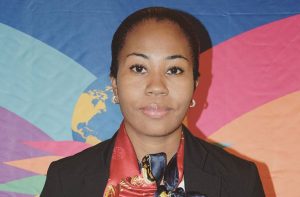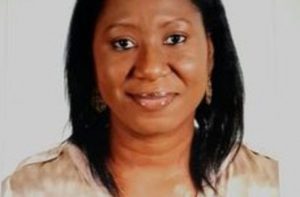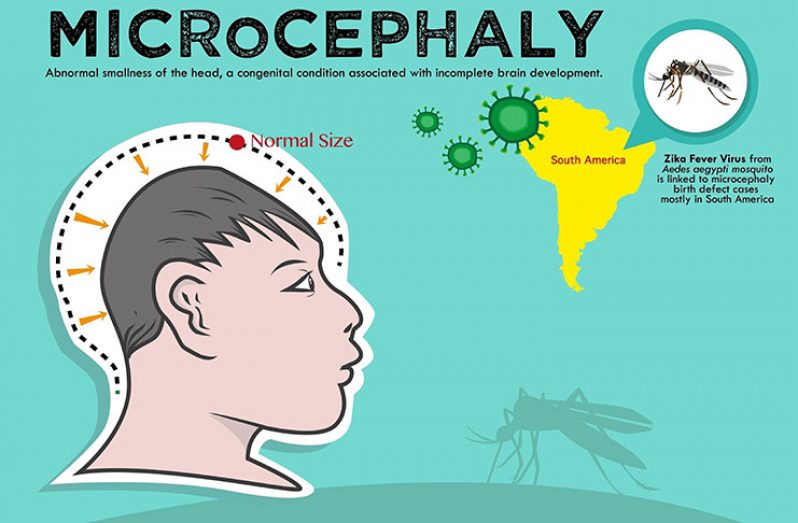SIX babies have been diagnosed with microcephaly so far for 2016, mere months after the first case of zika infection was registered in Guyana.The cases have not been linked to the zika virus, as none of the pregnant mothers has developed signs and symptoms associated with the virus, which broke out in neighbouring Brazil in late 2014. One of these six babies was a stillbirth.

According to the Centers for Disease Control (CDC), zika is spread mostly by the bite of an infected Aedes Aegypti mosquito, and can be passed from a pregnant woman to her foetus. It can also be spread through sexual contact. Once a pregnant woman is infected, her baby can have defects when born.
The CDC also noted that those infected with the virus either would not have symptoms or would have mild symptoms; but the most common of the symptoms are fever, rashes, joint pain, conjunctivitis, and headache.
There is currently no vaccine or cure for the zika virus.
Microcephaly, on the other hand, is a birth defect wherein a baby’s head is smaller than usual when compared to babies of the same age and sex.
Babies with microcephaly often have smaller brains that may not have been fully developed during pregnancy, or have stopped growing after birth, the CDC said.
The occurrence of microcephaly was a shocker for Felicia Lewis, 18, a first time mother who had never previously heard of the disease. Opening up to Guyana Chronicle after some hesitation, Lewis, who hails from Region 7, in a low tone of voice, said she was expecting nothing but a healthy baby girl.
“I was surprised at first, but not scared,” she said, pointing out that despite the abnormality she embraced her new born with deep love, care and affection. The infant, born in September, has been doing well, and family members have been very supportive, the young mother said.
“I worry about her… because she was born with this sickness,” Lewis said, relating that her husband was also worried, but “told me everything would be okay…because we trust in God”.
While upbeat about the future of her child, the young mother said she is a bit worried that her daughter would be subjected to stigmatisation once society finds out that she has microcephaly.
Guyana’s first case of zika infection was reported in January, a few months after Brazil reported to the World Health Organization (WHO) that it suspected it had 141 cases of microcephaly in Pernambuco state.
By November 2015, that country had declared a national public health emergency as cases of microcephaly continued to increase. The following month, Brazil reported 2,975 suspected cases of microcephaly, a number which was higher than any other part of the north-east region.
So far, Guyana has reported only 35 cases of zika. Zika, however, was not the only infection that was prevalent around that time, as chikungunya was still on the radar. Like zika, chikungunya is a mosquito-borne disease that is transmitted by the aedes aegypti mosquito, the same mosquito known to spread dengue and yellow fever diseases.
Adolescent Health Coordinator of the Ministry of Public Health, Dr Oneka Scott, was the acting Maternal and Child Health Director just around the time the second baby was born here with microcephaly after the outbreak in Brazil.
HIGH GEAR
Health officials, she said, went into high gear. “We have a team approach. The Government, through the Ministry of Public Health, has paid lots of attention to psycho-social support; it is not easy giving birth to a child with microcephaly,” she said, while noting that locally there is some doubt of the correlation between microcephaly and zika.

Earlier this year, the New England Journal of Medicine published the preliminary results of a large study done on pregnant Colombian women infected with zika; and according to that study, of nearly 12,000 pregnant women infected with the virus, there was no case of microcephaly.
Brazil, however, has sought to link the two; and that is something that must not be taken for granted, said Dr. Scott.
“This is the basis of our response, because we need to prepare these women if any were diagnosed with zika. We needed to have information out there that would lend to informed choices; not for everybody to jump and say ‘Oh, I am diagnosed with zika’, or ‘I have symptoms and I want to have an abortion because I am pregnant’,” she told Guyana Chronicle.
When the first case was diagnosed here, a team of workers — including a surveillance officer, a doctor, public health nurse, a representative of the vector control office and a counsellor — was formed to provide psycho-social support to pregnant women who were infected with zika.
“We tell them what to expect; what are the likely outcomes and, most importantly, what are their choices,” Dr. Scott said, noting that abortion is legal and remains an option.
“It isn’t just another child, it is a child with special needs,” she stressed, disclosing that the six mothers who delivered babies with microcephaly were not previously diagnosed with zika.
Dr. Scott also pointed out that microcephaly is not new in Guyana, and has been around even before zika.
“We do not know where our baseline is… if it is that we saw one or two microcephaly babies per year; this is less than a month that we have six. So you have to put a question mark of doubt, and you have to act upon that doubt and create an action plan…which is already created because of the association of zika and microcephaly,” she added.
According to her, during investigation, the Georgetown Public Hospital Corporation (GPHC) could not state the number of babies born there with microcephaly. “Nobody could have told me for 2014 or 2015 if we had two or three cases,” the doctor told Guyana Chronicle.
MULTI-SECTORAL APPROACH
The Ministry of Public Health is collaborating with the Ministries of Education and Social Protection to create a multi-sectoral approach to dealing with children born with microcephaly.
“To have a child with microcephaly -– a child with special needs, the development is slow. They reach milestones less, the care may be more, and you may have a child who cannot be put in regular daycare; so some type of public assistance or external Government support is needed. The Ministry of Public Health cannot do it alone,” Dr. Scott said, noting that rehabilitation for each child is a must.
Dr. Ertenisa Hamilton, Director of the Maternal and Child Health Department of the Ministry of Public Health, has been working on the protocols, work plan and other documents relative to microcephaly, even before a case was reported.
Disability and Rehabilitation Director Ariane Mangar said that when children are born they are evaluated, and those with abnormalities are referred to a rehabilitation facility for treatment.
At these State facilities, all services are free of cost.
Mangar, like Dr. Scott, made it clear that microcephaly is not a new phenomenon here, but noted that persons are more aware of it now because of the zika virus and all the reports related to it.
Psychologist Mosa Hutson said that while there is much awareness about zika, not much is known about microcephaly; and this gap must be closed, since it can help in staving off stigmatisation.
“There (are) lots of stigma attached to people and children who are differently-abled…. Young parents are not as strong as the experienced ones, and we have to support them. The child must have as much support as possible, despite what society would say,” she said.
Hutson noted that the brunt of the worry comes from what people say. She stressed that parents ought not to be ashamed if they see their child are born with microcephaly.
She is currently working to have group sessions with mothers who have children that are infected with microcephaly, to facilitate information sharing among them so that they can better care for their bundles of joy.



.jpg)









